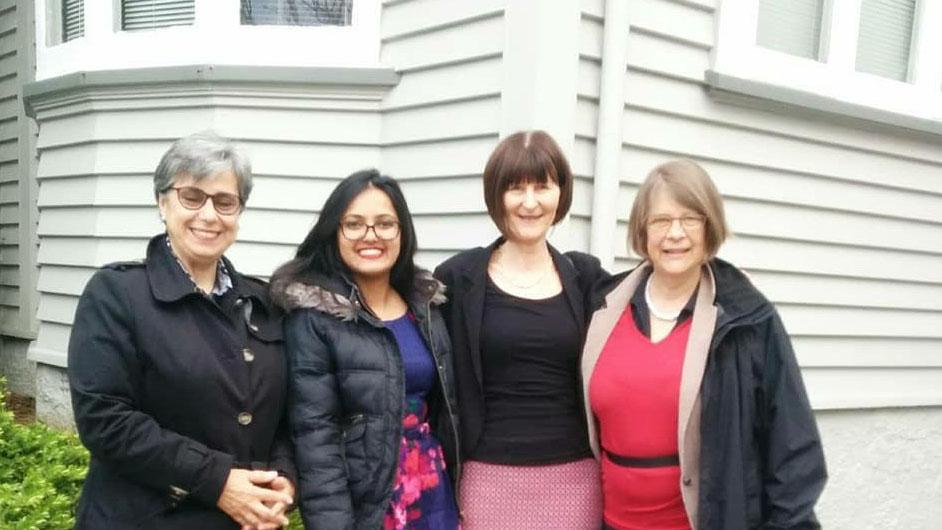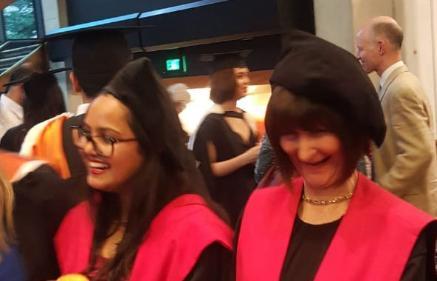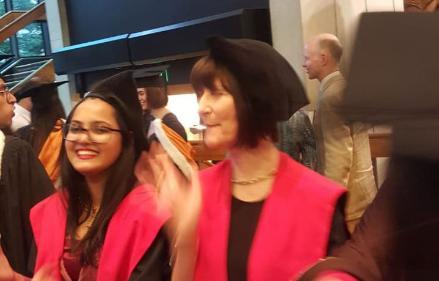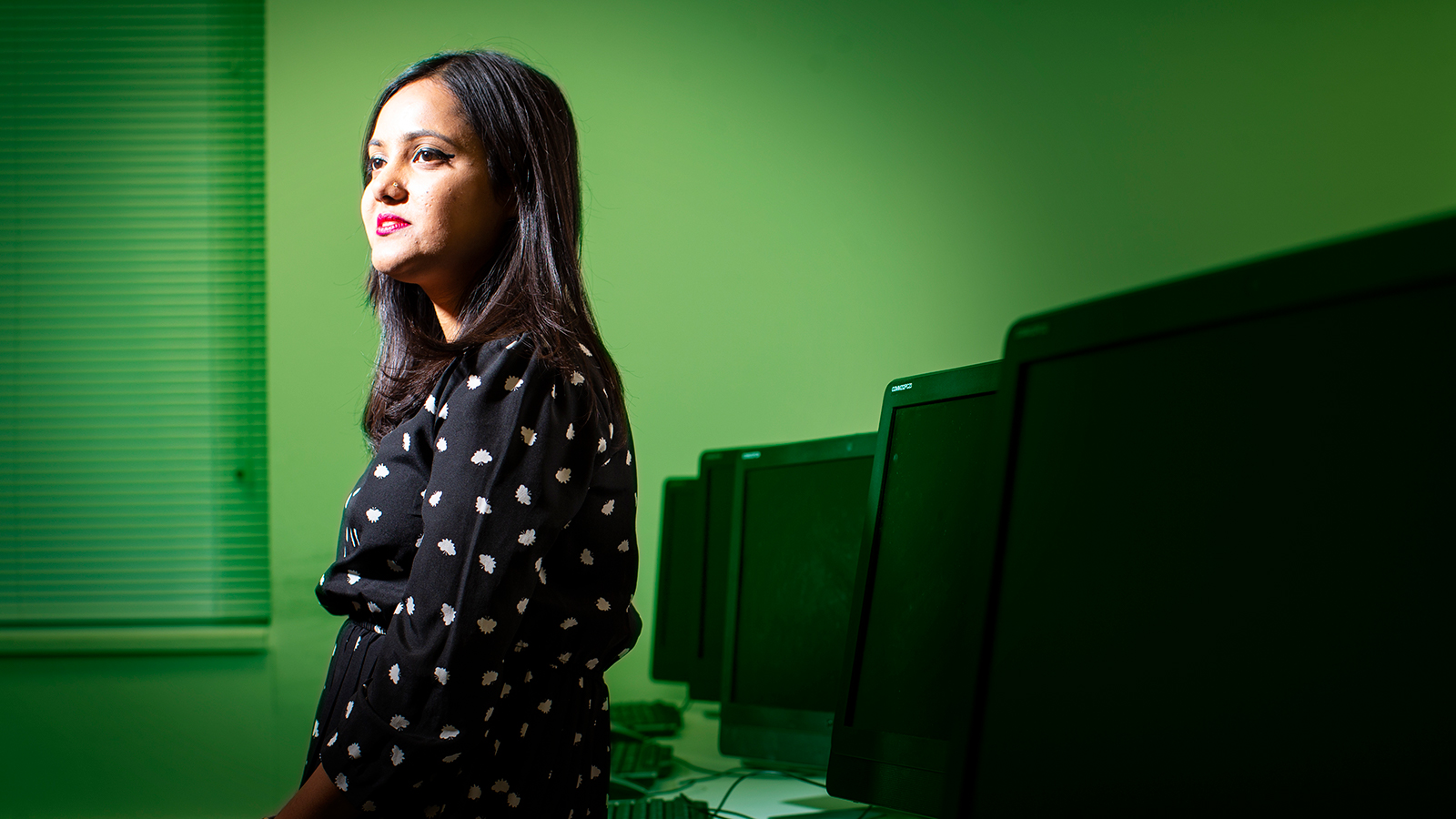March 4, 2021
Women in partnership: Dr Farzana Tanima and Professor Judy Brown
In the lead up to International Women's Day on March 8, Global Challenges is sharing stories of women in academia who have developed partnerships and mentorships, to celebrate their collegiality and friendship. These partnerships show the power of women when they come together, to face challenges and adversity. Thank you to all women who took the time to share their stories and who will no doubt inspire the next generation of women in research.

Image left to right: A/Prof. Mary Kaidonis (UOW), Dr Farzana Tanima (UOW), Prof. Judy Brown (Victoria University of Wellington) & Professorial Fellow Karen Van Peursem (Victoria University of Wellington)
Dr Farzana Tanima, School of Accounting, Economics and Finance, UOW
I first met Judy in my ACCY421 (qualitative research methodology) class in 2009, during the last (honours) year of my university undergraduate studies (at Victoria University of Wellington, New Zealand). She was the coordinator of the subject. I found Judy’s way/philosophy of teaching fabulous!!
I remember she would subtly throw in the strangest of questions and invite us to be inquisitive about various social issues. She was the first one to have introduced our class to this really ‘out there’ idea that a technical discipline like Accounting, can impact on organisational and societal realities, and vice versa. I struggled with these notions initially. I mean really, Accounting is about debits and credits, assets and liabilities, and expenses and revenues right?? It is binary, logical and hence beautiful. Given my rigid, objective, science and mathematics-oriented background from back at home – Bangladesh – I constantly challenged these ideas in our weekly journal (reflective notes) assessments. Judy would scribble on these notes and answer my questions with further questions. For example, once she scribbled: “do you think there is basic difference between ‘physical’ reality and ‘social’ reality”? It is these kinds of subtle back-and-forth conversations with Judy within assessment tasks, which slowly opened me up to a different form of being and seeing the world around me, and I just loved every bit of it.
“Judy is undoubtedly the best teacher/mentor I have had in my entire life. She has never imposed her ideas on us as students, but would invite us to be inquisitive, think critically about differing social issues, and imagine alternative pathways for transformative changes.”
This motivated me to sign up for another qualitative Accounting subject, ACCY413, in my second trimester, where I wrote an essay on the intersections between Accounting and Feminism. Judy is undoubtedly the best teacher/mentor I have had in my entire life. She has never imposed her ideas on us as students, but would invite us to be inquisitive, think critically about differing social issues, and imagine alternative pathways for transformative changes. Judy’s approach to teaching is what inspired me to pursue a qualitative project for PhD, and here we are, 11 years later – she has been an amazing friend throughout, and I just love working with her, and chatting with her.
What makes me click with Judy is her amazing personality. She is extremely kind, thoughtful and you can always count on her. I have been able to open up to Judy not only about my professional self, but also about my personal self. When she met my husband, she instantly embraced him, and was so friendly to him. She did the same with my parents when they visited from Bangladesh in 2011. Judy has played an extremely important role in shaping my academic career, and I am so very grateful to her for being such a great source of support.
In supervising my current PhD students, I draw on examples from student-supervisor relationship I have shared with Judy. Judy’s style of supervision was all about showcasing patience, being respectful of ideas that you bring on the table and guiding that accordingly. During these engagements, she valued independent thinking, and would always try to create an environment where you could thrive – through allowing plenty of time for you to think, reflect and critique. Also, as a student, I always felt that I could trust her. She always maintained confidentiality regarding any matters that I shared with her. This is the example I want to live by when it comes to my relationship with students.
“What I appreciate about my relationship with Judy the most, is that she has always continued to maintain a strong partnership with me, even after us being in geographically different locations. We maintain constant communication with each other regarding various research projects that we are involved in, and also in a personal capacity.”
What I appreciate about my relationship with Judy the most, is that she has always continued to maintain a strong partnership with me, even after us being in geographically different locations. We maintain constant communication with each other regarding various research projects that we are involved in, and also in a personal capacity. She is a genuine friend, and I am extremely grateful for the mentorship that I continue to receive from her.


Professor Judy Brown, Victoria University of Wellington
Professor of Accounting and a Fellow Chartered Accountant of Chartered Accountants Australia and New Zealand (CAANZ).
I first met Farzana in 2009 when she was a student in two of my Honour’s courses. She impressed me with her clear intellectual ability, creativity, conscientiousness and engagement in the classroom and I encouraged her to undertake PhD study. I was her mentoring Professor when she joined Victoria University of Wellington as a Graduate Assistant in 2010 and also her PhD supervisor. Her PhD thesis – a participatory action research case study on (which won two international awards) – was undertaken as part of a Marsden funded research project: Dialogic Accounting: The Challenge of Taking Multiple Perspectives Seriously. I was the principal investigator on the project with Farzana and her close friend Sendirella as PhDs.
However, Farzana wasn’t always sure academic life was for her. In the first journal exercise she completed for my qualitative research methodology course she honestly advised that she found “research rather boring” and that she was more interested in science and numbers than more “waffly” research. Fortunately for Victoria University of Wellington and the University of Wollongong, she caught the qualitative research bug!
“I’ve learnt so much from Farzana about taking ideas into the field. I am in awe of her ability and commitment to her work on microfinance and women’s empowerment and have found it really exciting to see how she has translated some of my more ‘abstract’ ideas into practice. Plus, she’s an incredibly good friend – genuine, caring and fun to be with.”
Over the years, our relationship has developed into a great partnership/friendship and we’ve collaborated on various projects and papers. Farzana is brilliant to work with. She was a “model” PhD student – tons of initiative, curious, passionate about her research, highly organised and dedicated to making a difference – and she’s carried all of that and more into her academic career.
Most of my research has focused on developing critiques of conventional accounting and conceptualising alternatives, but I’ve learnt so much from Farzana about taking those ideas into the field. I am in awe of her ability and commitment to her work on microfinance and women’s empowerment and have found it really exciting to see how she has translated some of my more ‘abstract’ ideas into practice. Plus, she’s an incredibly good friend – genuine, caring and fun to be with. I really treasure our relationship and sharing all her work and life news – most recently building houses, getting that “driving license” and soon to be a mum.
UOW academics exercise academic freedom by providing expert commentary, opinion and analysis on a range of ongoing social issues and breaking news. This expert commentary reflects the views of those individual academics and does not necessarily reflect the views or policy positions of the University of Wollongong.
